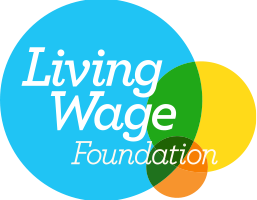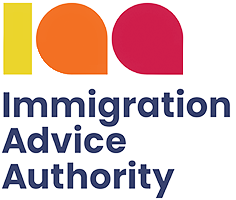Through our research, frontline advocacy, and policy engagement, we work to influence housing policies and practices to ensure that all women – regardless of their background or immigration status – can access the safe, stable homes they need to rebuild their lives.
Our research and policy work are rooted in our frontline experience, directly supporting survivors as they navigate the complex housing system. By amplifying their voices and advocating for systemic change, we aim to break the cycle of re-victimisation that too many women face.

OYA was established in response to the systemic neglect of Black and Global Majority women’s needs within the UK’s housing and VAWG sector. Generic women’s organisations often receive the bulk of funding and contracts, leaving specialist, culturally competent services underfunded and at risk. OYA members work together to:
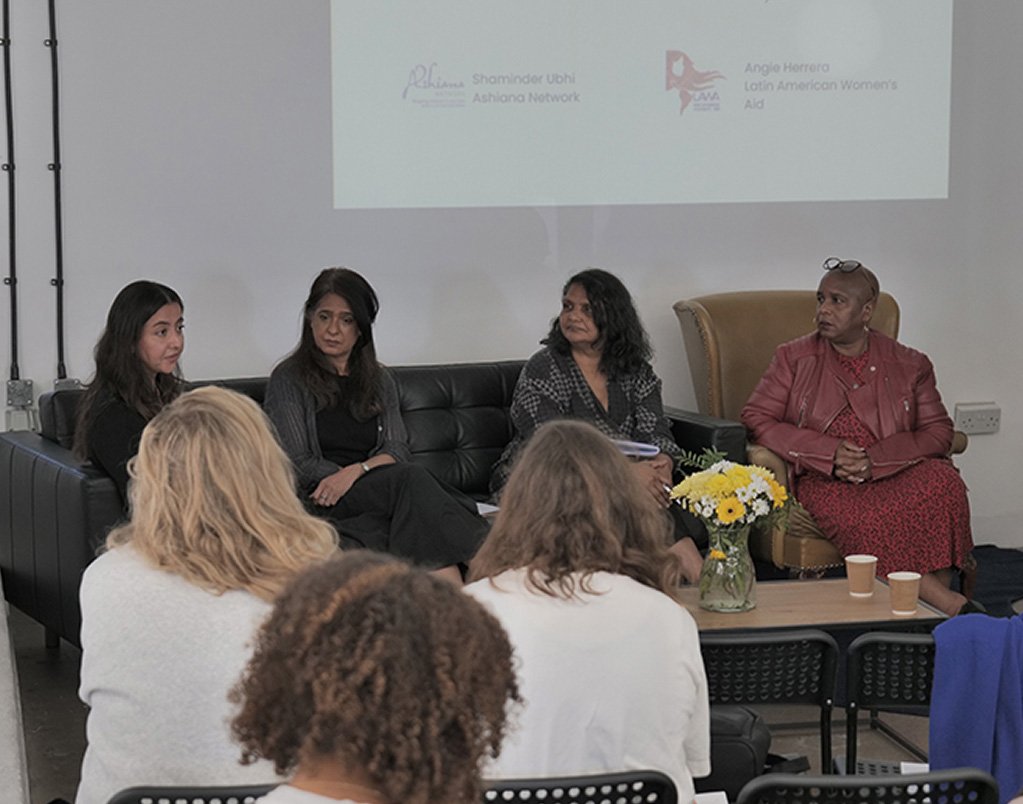
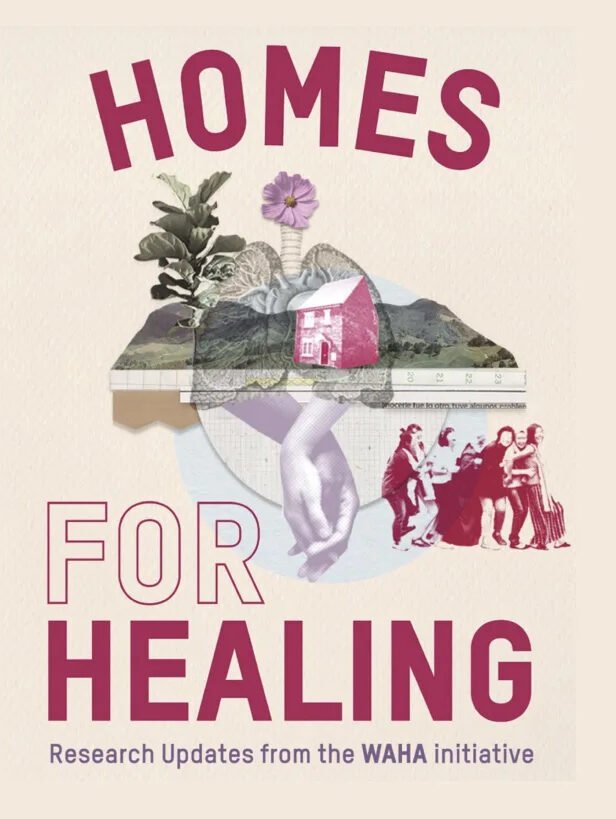
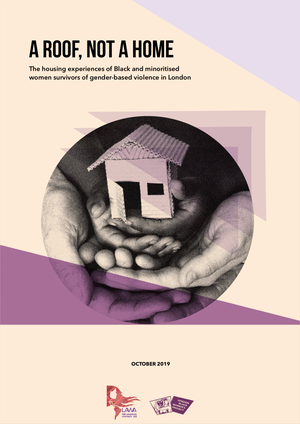
This research focuses on the first year of WAHA’s work, offering an in-depth analysis of the barriers global majority women face when seeking safe accommodation. The report examines systemic discrimination, gatekeeping practices, and failures in local housing provisions, and presents a call to action for policy reform.
Our research reveals that global majority women fleeing violence often face severe housing inequalities due to:
These systemic failures not only jeopardise women’s safety but also perpetuate cycles of violence and homelessness.
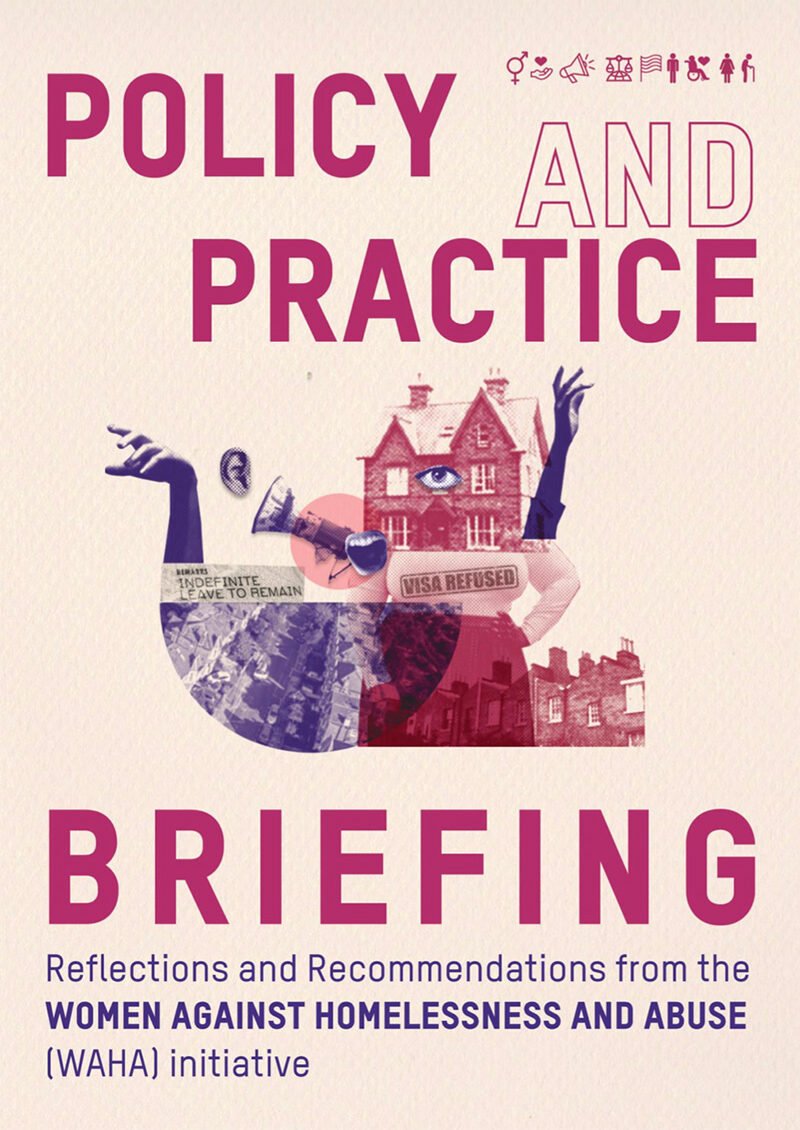
Based on our research and frontline experience, we advocate for:
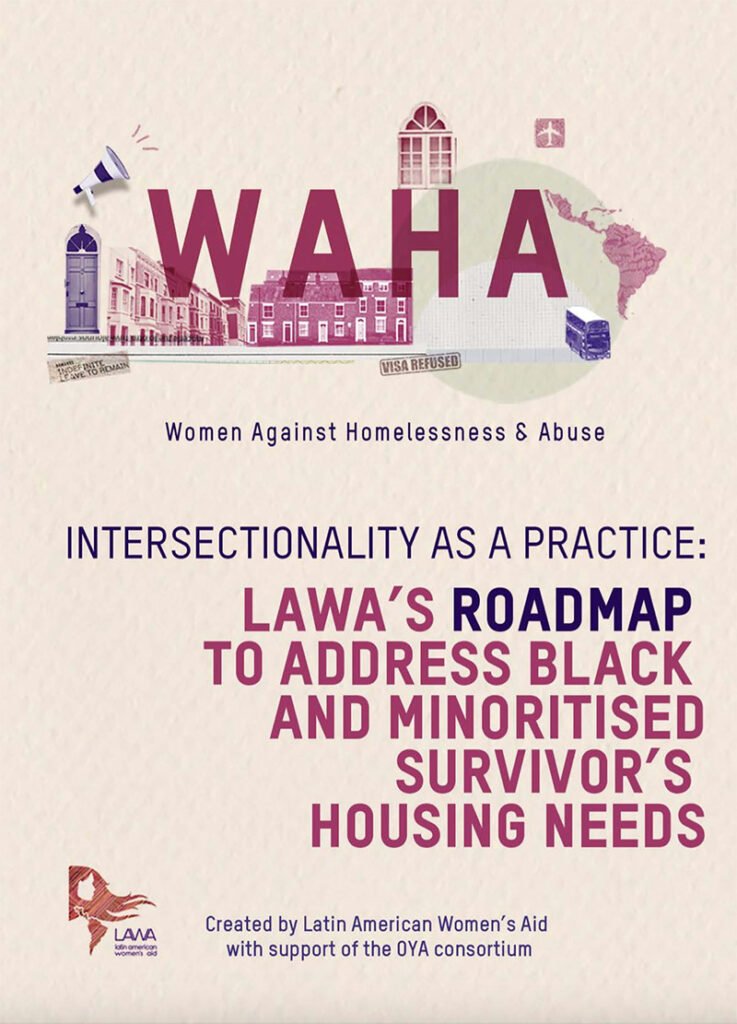
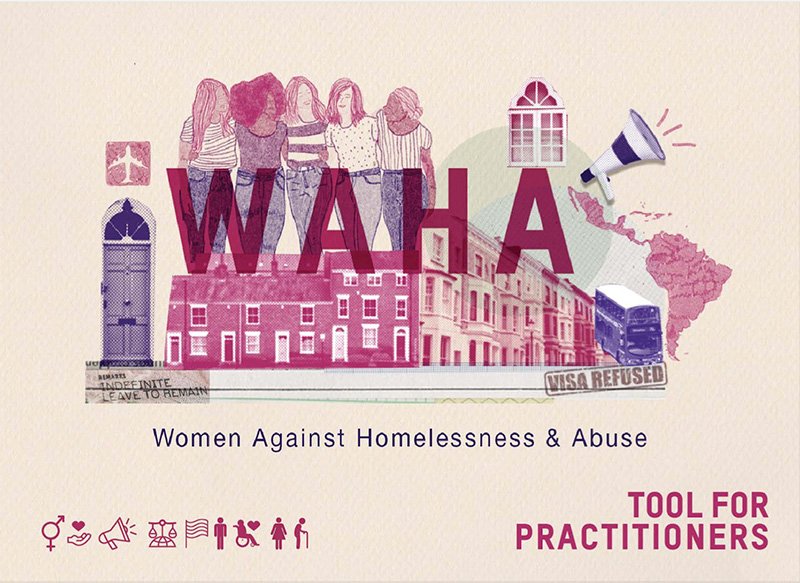
Alexandra is a 58 years old woman, who fled Spain due to domestic abuse incidents suffered by her partner during the 30 years of living together. She arrived in the UK in 2019, and due to serious medical problems as well as the pandemic she lost her job. She left the family house, fearing that her ex-partner could find her by using their daughter to get information of her whereabouts. In the UK, she was staying at her sister-in-law’s place where the perpetrator could easily come and visit at any time.
Alexandras’s sister and niece threatened her with killing her if she decided to go back to Ecuador.
Alexandra stayed for 10 months at one of LAWA’s refuge, and was supported to make a housing application. Although she was granted Temporary Accommodation by the council, the property was unsuitable to live in due to a rat infestation. The neighbours had also reported having rats in their flats, which meant it was something affecting the whole building. Despite her reporting the situation to the letting agent, it took a while for them to find a proper solution forcing Alexandra to sleep at the floor of one of her friend’s homes. Overall, it took four months for her to be offered a private and secure rent.
Alexandra’s experience with social accommodation in poorly hygienic conditions is not isolated. In recent years, council housing conditions in London have been questioned and even described as “appalling”, “unliveable” and “dangerous” by many residents who complain to their landlords without significant action being taken.
According to data from the London Assembly, 15 % of London’s social properties fail to meet the Government’s Decent Homes Standards, namely: meeting the statutory minimum standards for housing; being at a reasonable state of repair; having reasonably modern facilities and services; and providing a reasonable degree of thermal comfort.
Alexandra’s case highlights a reality that, unfortunately, is shared by a large number of vulnerable people at risk of homelessness and/or that are supported by various forms of social housing: the fact that the standards of habitability and facilities of those properties is found lacking, if not severely compromised. We have seen this kind of issue having fatal consequences in the UK in a number of cases, so it is vital to raise awareness and take prompt action in support of survivors in effective ways.
Angela arrived at one of the LAWA refuges via an external referral. She is a 42-year-old Peruvian woman who worked as an accountant and photographer in Peru. She moved to the UK 13 years ago and was living with the perpetrator, his two children and his elderly mother until fleeing last year.
The perpetrator was verbally and sexually abusive towards Angela, controlling her life, her decisions and her finances, as well as her food intake. He was constantly threatening to “cancel” her visa, jeopardizing her right to stay in the UK. He had many affairs with other women, whilst constantly accusing Angela of infidelity. On multiple occasions when Angela tried to call the police for help, the perpetrator would threaten her by saying he would tell the police she was mentally unwell, and that his daughters and mother would testify to this.
Angela was responsible for looking after the perpetrator’s family while he was away on long business trips, making sure his children were fed and safe whilst also caring for his elderly mother.
The perpetrator made constant threats on Angela’s life and she truly believed he did not want her to leave that house alive. One of the scariest things for Angela was that the perpetrator legally possessed firearms, which were kept in the house. Angela did not feel comfortable returning to her home country, Peru, as she feared that the perpetrator would use his contacts and influence in this region to continue to harm her.
Last year, after a particularly violent incident in which the police were involved, Angela got in touch with a domestic violence organisation and left the house. The perpetrator was put on bail, facing charges for common assault. However, the coercive control charge he initially faced, was dropped.
After being referred to our services, Angela was moved to one of LAWA’s refuges for her safety, we supported her with her PTSD and anxiety. Since she moved to the refuge, Angela started to sleep better, but occasionally had nightmares where the perpetrator was trying to kill her.
In January of this year, Angela’s location in the refuge became known to the perpetrator. It is believed that the perpetrator hired a private investigator to locate Angela in order to serve her with divorce papers. This not only jeopardized Angela’s safety, but that of the other refuge residents, as well as LAWA staff. As a result of this breach, LAWA chose to move Angela into another one of our refuges in order to ensure her safety.
Angela is facing divorce proceedings and her case is in court. With LAWA’s support and help, she has been able to access counselling to process the severe emotional and physical impacts of the abuse. The WAHA project has also given her help to secure Universal Credit, housing benefits, career advice and supported her in the process to access UK citizenship (pending citizenship ceremony).
Angela is now ready to move on from the LAWA refuge into an independent living arrangement. She will be moving in with some friends as a lodger and will continue to be supported through our resettlement programme to accompany her journey to self-sufficiency (once she has the means to do so).
The way in which this case reached a conclusion is not necessarily the norm. Often, as a result of the isolation that their abusers perpetuate, survivors loose access to their support networks. What is more frequent is that survivors would only be rehoused in ‘temporary’ accommodation, or would have to access housing through the private rented sector, given that, unfortunately, securing social housing is increasingly challenging due to the massive shortage of safe and suitable accommodation for vulnerable people in the country, a situation that is most acute in the London area.
Angela’s case highlights the multitude of complexities that can arise when dealing with cases of domestic violence and coercive control. The fact that charges of coercive control have been dropped against the perpetrator highlight the difficulty faced in progressing cases of this nature, in spite of the clear psychological and emotional damage this causes survivors.
Emma is a Colombian woman and mother of an autistic child. She was referred to LAWA by a local authority body because she suffered sexual, physical, psychological, financial and many other forms of abuse from her partner. Although they separated, she continued to receive death threats from him and his family, which later escalated to physical assault and harassment.
She was violently attacked in several occasions, being left significantly distressed. As her safety was compromised even at her own home, Emma was living in constant fear for her life and her daughter’s.
LAWA got involved in different stages of Emma’s case, providing support in areas ranging from psychological counselling to legal advice. LAWA’s holistic support facilitated the involvement of the police for a restriction order again her ex-partner, and provided assistance with translation of official documents and communication with authority officers, as English was not her first language.
Despite the severity of the case, the multiple agencies involved to safeguard Emma and her daughter’s life, and the restriction order; housing officers questioned her for not speaking to them directly in regards to the housing application.
In addition to this, she had to go through a long process -and it took a great amount of advocacy from
LAWA- for her to be able to stay at her place (which is adequate to her children’s needs), as she was told she was not considered a tenant but an occupant.
Emma case highlights the concerning lack of knowledge from the part of some housing officials when it comes to supporting adequately survivors of domestic violence.
Worryingly, this case also illustrated the perverse consequences of insecure forms of tenure for survivors of abuse – which effectively turn into additional barriers to safety and increased vulnerability.
Flavia is a Brazilian, heterosexual, and mother of one. She was married for 14 years, a period of her life that she experienced financial, sexual, physical abuse, use of her immigration status to exert control and controlling behaviour. Flavia’s routine was restricted by the perpetrator, and she had no network support in the UK. She used to spend her days alone in her house taking care of their child. Flavia was not allowed to go to work and was left without access to a phone. The perpetrator had a drug and alcohol addiction, and for this reason, he barely provided food or nappies. As she recalls, most days he came back home late at night, and when he returned, he was aggressive. He shouted and hit objects, and also sexually assaulted her in different occasions, for this reason she was sleeping on the sofa. For a long time, she planned to leave her house, but she saw many obstacles: she was financially dependent, her visa was linked to the perpetrator, she was not confident with her language skills and had no idea where to start.
One day she met a woman who referred her to LAWA and Flavia decided to tell her story. She contacted the organization seeking for help to leave the house she was living with the perpetrator. LAWA’s caseworkers advised her to fill a police report and contacted immigration lawyers. Flavia went to the police station and due to the severity of the situation, they helped her to collect her belongings and leave the family house that same day. She was transferred to a temporary accommodation where she stayed 6 months and then to another self-contained flat where she currently lives.
Flavia is in a recently refurbished flat, in a neighbourhood close to public services, transport and her son’s school. She says that she is very grateful for being placed in this flat. Flavia’s case is an example of good practice, as she feels that she was listened to by the local authorities who understood the problem and acted fast to support her. Throughout the process Flavia said that the local housing and children’s service team assisted her, whether gathering donations or detecting her family needs to provide a decent accommodation. When they moved to the first temporary accommodation, this assistance was fundamental because they left the family’s house in a hurry. She says that her son was frightened with the situation, hiding behind the sofa to not leave the house. She left the home that she lived for years, just with the essentials.
Flavia says that the beginning of this journey was extremely hard, that even her did not believe when she told her story to the police. She thought nobody would believe how she could stay more than a decade in an abusive relationship. Fortunately, Flavia was supported by comprehensive and approachable staff, who took Flavia’s case seriously, helping her to start a new phase of her life. After moving to the accommodation, LAWA supported Flavia mediating the communication with the housing team and following her homeless application and child benefit. The caseworkers also contacted a solicitor to advise Flavia regarding the children’s arrangements and her immigration status.
Gloria is a 35-year-old Colombian woman who has been living the UK since 2020. She lived with a partner in a sublet house from a mutual friend. She recently fled her home to escape this abusive relationship. She went to the police station to report a recent episode of aggression and left her house. While men are generally able to remain on the property even when the tenancy is shared, having to move out of the home is a common scenario for survivors of domestic violence. With nowhere else to go and no prior knowledge of how the social system worked, she sought help.
In the process of reaching out to public authorities, she reports being stereotyped discriminated due to her nationality and physical appearance. She says that although a police officer has been assigned to support her needs, communication has been inconsistent and intermittent. After a first cold and victimizing contact with the authorities, Glória was placed in temporary accommodation. The space where she currently lives is small, but comfortable and in a different neighbourhood where the aggressor resides. Gloria moved into this location almost two months ago but has yet to sign the lease. On this matter she claims that communication with the local housing officer has been non-existent after her entry into the property. The lack of communication from the authorities is something that causes anxiety and insecurity in women. Without a communication channel they cannot ask for support with housing issues or have no idea how long they will live in accommodation, for example. As another LAWA client said: “We are left in the dark and motherhood does not come with instability. Just the thought of having to take my baby and all my belongings and go somewhere else without warning scares me.”
The uncertainty regarding accommodation reflects on other aspects of Glória’s life. She says that the lack of stability in relation to her home affects professional decisions and her mental health. LAWA service users, such as Gloria, say that if the authorities had transparent communication, keeping them updated on their cases, it would help to establish a sense of normalcy in their lives and reduce the anxiety of being homeless again. Unfortunately, women in the process of recovery have to chase the authorities and resort to specialized services to intercede for them in this complex system.
Finally, to deal with the trauma resulting from the multiple assaults she suffered and her current life situation, Gloria turned to LAWA’s holistic approach and has been attending counselling sessions. Connecting with other women in the community has also been an important part of Gloria’s healing. Meeting women with similar experiences has helped with her emotional stability and self-esteem.
Karina is a 31-year-old black Brazilian woman and the mother of a newborn baby. After three years living in the UK, she became pregnant, but the news was not well received by her partner. Karina reveals that she has suffered verbal, emotional, psychological abuse, and coercive control. Her partner constantly harassed her to get an abortion, which resulted in a difficult pregnancy. During one argument she had contractions and ended up in the hospital, where the midwife contacted the authorities regarding domestic violence. That day Karina did not return home. Karina has a pre settled status dependent on the perpetrator and is classified as non-recourse to public funds (NRPF). Although Karina was homeless and her baby at risk, she could only have access to government support when the baby was born. LAWA had to intervene to find a space in a refuge association for her last months of pregnancy and started the housing application with the local council. Until going to the maternity, Karina had no information where she would go next. When the baby was born, Karina was offered a temporary accommodation in a hotel. When she arrived, she did not feel relief. The room was filthy, it had no kitchen or windows and there were people with addiction problems in the building.
With a newborn baby and still recovering from childbirth, she cleaned the space after an intense moving day. Inadequate temporary accommodation is a reality in the UK. Many women are placed in mixed spaces without access to basic facilities like a kitchen where they can prepare meals or do the laundry. Lack of access to Internet is also a recurrent issue, along with rat infestations and mould. Once again, LAWA’s caseworker advocated for Karina to find an alternative, and she was transferred to a Bed and Breakfast style accommodation. The space Karina was allocated still presents some challenges for a recent mother; for example, she has to wash the baby bottles in the bathroom sink because the kitchen is in another level of the house. She explains that to go to the kitchen she needs to take the baby, her utensils, and take the stairs, and this was especially difficult in the first weeks after the childbirth.
As a black, Brazilian woman fleeing domestic violence Karina says that unfortunately she did not have a positive experience with the council housing team. Articulating and understanding the intersecting layers of oppression like gender, race, and migration status is fundamental to correctly assess the needs of the women, but also guarantees humanised support for women like Karina.
Lucia is a 36-year-old Uruguayan who arrived in the UK in 2018 with her longtime partner and a daughter from a previous marriage. For almost a decade she suffered various forms of abuse, including physical, sexual, psychological abuse, and controlling behaviour. Since the beginning of the relationship, her partner dictated all aspects of her life, from how she styled her hair to her wedding gown. Lucia lived under his supervision, as he installed cameras in the house and an app in her phone to track her daily activities and conversations. He often had jealously attacks and was aggressive towards Lucia and her daughter, including in public. Once during one of these arguments, while he was driving them home, he started speeding up the car and threatened to throw the vehicle over a cliff. This violent attitude worsened when Lucia had a child and she found herself isolated from her support network. Lucia travelled to her home country to flee this relationship and to be supported by her family; however, the perpetrator alleged she had kidnapped the child.
Lucia had to return to the UK due to a legal imposition to share the child custody. Arriving in the country she called LAWA and the authorities to take the first steps towards finding safe accommodation and protecting her son. She filled a police report. However, the perpetrator continued stalking and harassing Lucia online, and she feared that this action could trigger a more violent response. Lucia’s case was classified as high risk and she had approved a non-molestation order. LAWA supported Lucia in the court hearings and to trace a housing plan. Often, women like Lucia report this experience with the authorities as humiliating and traumatic. During this process, she revealed the need to repeat her story several times, being discredited and judged for seeking government help, and questioned for not returning to her home country.
Lucia notes that she was treated differently for being Latina. She recalled needing to beg for help and having to clarify that she did not want to be in the UK in this vulnerable situation, but that she had no alternative. Domestic violence survivors recurrently highlight the need to prove to authorities the specificity of this moment in their lives, retracing their past professional trajectories to show they are hardworking and not someone who wants to abuse the system. The lack of sensitivity and specialised training by the police and statutory services to deal with victims of VAWG means that migrant women like Lucia face a discriminatory approach before being supported.
With LAWA’s help Lucia approached the local council and applied to have her visa status unlinked from her ex-partner. She was placed in a temporary accommodation where she is living with her son. She returned to work as a teacher assistant. Although she describes the neighbourhood as a little bit insecure at night, the flat is self-contained and is in excellent condition.
Recollecting her story, Lucia says that it made a difference that she was involved in the process, that she was able to call and send emails to the local authorities, but she knows that this is not a possibility for many women, due to the lack of translator’s provision. Lucia’s regrets that women must revive traumatic moments to make themselves heard. She says that she can now finally talk about what she been through, but it was brutal and traumatizing to speak about this in the past.
Phone: 020 7275 0321
Email: info@lawadv.org.uk
© 2025 LAWA.
© LAWA Registered Charity
No 299975.
By subscribing to our newsletter, you agree to being contacted by us for campaigns, appeals, fundraising, news and general updates. You can unsubscribe at any time by clicking the link in the footer of our emails. For information about our privacy practices, please visit privacy policy.

